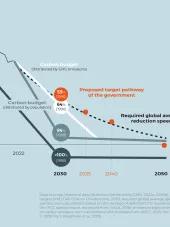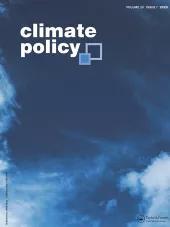Under an approach that distributes the remaining global budget as of 2020 to countries based on their emissions at that point and assumes a linear pathway towards zero CO2, Belgium would need to reduce total GHG emissions by 61.0% below 1990 by 2030. This approach is referred to as “grandfathering” and research widely acknowledges that this is not an approach that distributes global efforts in a fair manner, according to the principle of common but differentiated responsibilities and capabilities, but that this approach benefits countries with a comparably high share of emissions today and puts developing countries at disadvantage. The grandfathering approach can thus be seen as the absolute minimum for emissions reductions for a developed country like Belgium. Also, the assumptions of this report are relatively generous to Belgium in terms of the selected carbon budget: This report uses the budgets from IPCC AR6 working group 1. Working group 3 suggests more ambitious budgets already. A smaller global budget would require Belgium to decrease emissions even faster.
If the global carbon budget would be distributed to countries based on their population, Belgium would need to reduce total GHG emissions by 81.5% by 2030. This could be considered fair by some, but this calculation still does not include the relatively high capability and high historical responsibility of Belgium.
To fully unambiguously provide a fair share taking into account all characteristics of Belgium, it would need to reduce GHG emissions to below zero already by 2030. In essence, Belgium has used its fair share of the carbon space already.
Under the carbon budget approaches and a linear reduction of CO2 emissions, Belgium would reach zero CO2 emissions by 2040 (based on the grandfathering approach) or 2032 (based on a distribution by share of population). This means that the reduction pathways that the approaches imply likely reach GHG neutrality well before the year 2050, which Belgium currently targets for climate neutrality.
The carbon budget approaches can be understood as the absolute minimum that Belgium should contribute to global climate change mitigation based on considerations of fairness. For an unambiguously fair contribution, Belgium would need to go much further. Where this is not possible through domestic action, support to other countries for ambitious, transformative mitigation action is essential.






